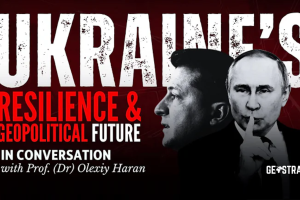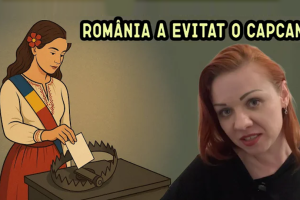Corruption in the everyday lives of Ukrainians: when, why and whom

Europeans and Ukrainians are watching the struggle of the Ukrainian corrupt system with anti-corruption structures. Three of the four necessary anti-corruption structures have been created: the National Agency for the Prevention of Corruption, the National Anti-Corruption Bureau, the Specialised Anti-Corruption Prosecutor’s Office. The Agency for the Prevention of Corruption turned out to be dependent on the Presidential Administration, the Anti-Corruption Bureau is under pressure, and the prosecutor’s office is not yet fully operational. The next step is to fight for the creation of the Anti-Corruption Court according to the standards of the Venice Commission.
However, combating corruption should not only be at the highest level. The results of a poll conducted by the Democratic Initiative Foundation show that domestic corruption is a major problem for Ukrainians, which has become a norm and is perceived as a necessity by the majority of Ukrainians.
Nearly half of the population – 44% – considers corruption to be the most serious problem in Ukraine and another 36% consider it quite serious. Only 2% of the population are certain that the problem of corruption was fabricated and 12% do not consider it a serious problem.
The prevalence of corruption in Ukraine is assessed by the population as extraordinarily high: 90% consider that corruption is highly prevalent, 50% of the polled noted that corruption is extremely prevalent and nearly 38% – that this phenomenon is sufficiently prevalent.
According to the population of Ukraine, the most corrupt institutions are the courts (52% of the polled noted that corruption in these institutions is very prevalent), the Verkhovna Rada (51% of the corresponding assessments), the Prosecutor General’s Office (45%), the Government (43%), the customs (39%), medical institutions (39%).
The people’s attitudes towards bribery are ambiguous. In particular, only 49% of the population assessed bribery as inadmissible, while 44% partially or fully justify it: as a “negative phenomenon, but in some cases it can be justified” (35%) or even as “a normal way of quick and effective problem solving” (9%). In the regional dimension residents of the Center and the Donbas give the most stringent assessments (there 58% and 57%, respectively, believe that bribery is an inadmissible phenomenon), while residents of the South gave the most lenient assessments (among them 59% in one way or another justify this phenomenon).
In the assessment of the corruption dynamics in Ukraine compared to 2014 negative trends somewhat prevail. Specifically, according to the 44% of the polled, corruption significantly or slightly grew, while only around 4% noted its decline (nearly 39% consider that it remained at the same level). Residents of the Donbas and the East (nearly 54% and 48% of the polled in the respective regions) most often noted the growth of corruption, while the residents of the West relatively less frequently noted such growth (about 39% of those polled).
Among those who over the past year personally came up against situations in which they had to give a bribe, the majority (51%) did so in medical institutions. Such situations were also relatively frequent in high schools (24%), in local bodies (around 15%), schools (11%) and in relations with the patrol police (around 11%). Accordingly, the most widespread cases of giving bribes were additional payment in medical institutions (38% of those who gave a bribe over the past year), admission to higher educational institutions (18%), admission to schools, registration to kindergartens (17%).
The majority of those who gave a bribe (53%) did this on the basis of information received directly from the employees of institutions they turned to: 27% were given a hint about such actions, while a bribe was openly demanded from 26%. Another 20% gave a bribe because they were convinced of its necessity. At the same time, there are considerable regional differences: residents of the East of Ukraine much more frequently faced a direct demand of bribe, while the residents of the South encountered such a situation most rarely. However, oriented themselves on their own personal knowledge (regarding the necessity of giving bribe) more often the residents of the West (30%) and the South (28%).
A third of those who over the past year gave a bribe did so because, in their opinion, if they did not do so, their problem would not be solved, while around 40% did this to more quickly solve their problem (that is, the problem would eventually be solved, but not as quickly as desired).
The most effective measures in the fight against corruption, according to respondents, are: strengthening of criminal punishment for corruption (the average grade was 3.5 on a scale of 5), the work of specialised anti-corruption bodies (average grade 3.2) and introducing legal examination of all normative acts (average grade 3.1). Meanwhile, respondents believe that performing an attestation of civil servants (average grade 2.4), raising salaries of civil servants (average grade 2.6), lustration (cleansing) of state bodies (average grade 2.9) are the least effective measures. At the same time, the above indicators show that the assessment of effectiveness of all measures is approximately at the average level, meaning none of the measures is considered sufficiently effective or very effective.
Among the actors capable of fighting corruption the following were named most frequently: citizens themselves (39% of the polled), the president (37%), specialised anti-corruption bodies (34%), mass media (33%) and the prosecutor’s office (33%). At the same time, the people put the least hope on political parties (10%), local authorities (11%) and tax bodies (11%). Herewith it is worth noting that the variant of an independent fight against corruption by citizens is in the first place among residents of the central region of Ukraine, while residents of the West, South and the Donbas first and foremost place their hopes on the president.
Author: Ilko Kucheriv Democratic Initiative Foundation (Ukraine)
Author : Ukrainian Liaison Office in Brussels








